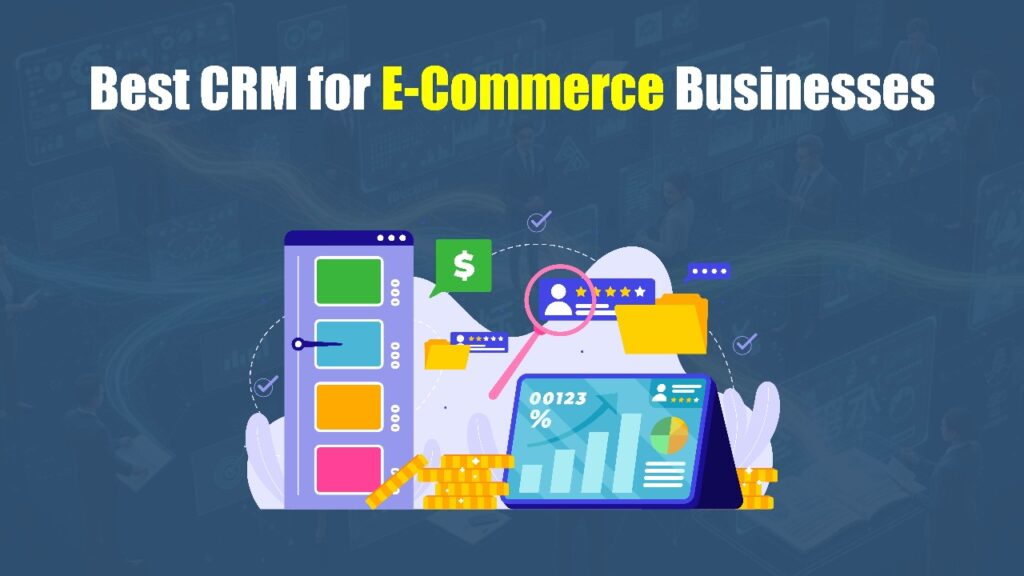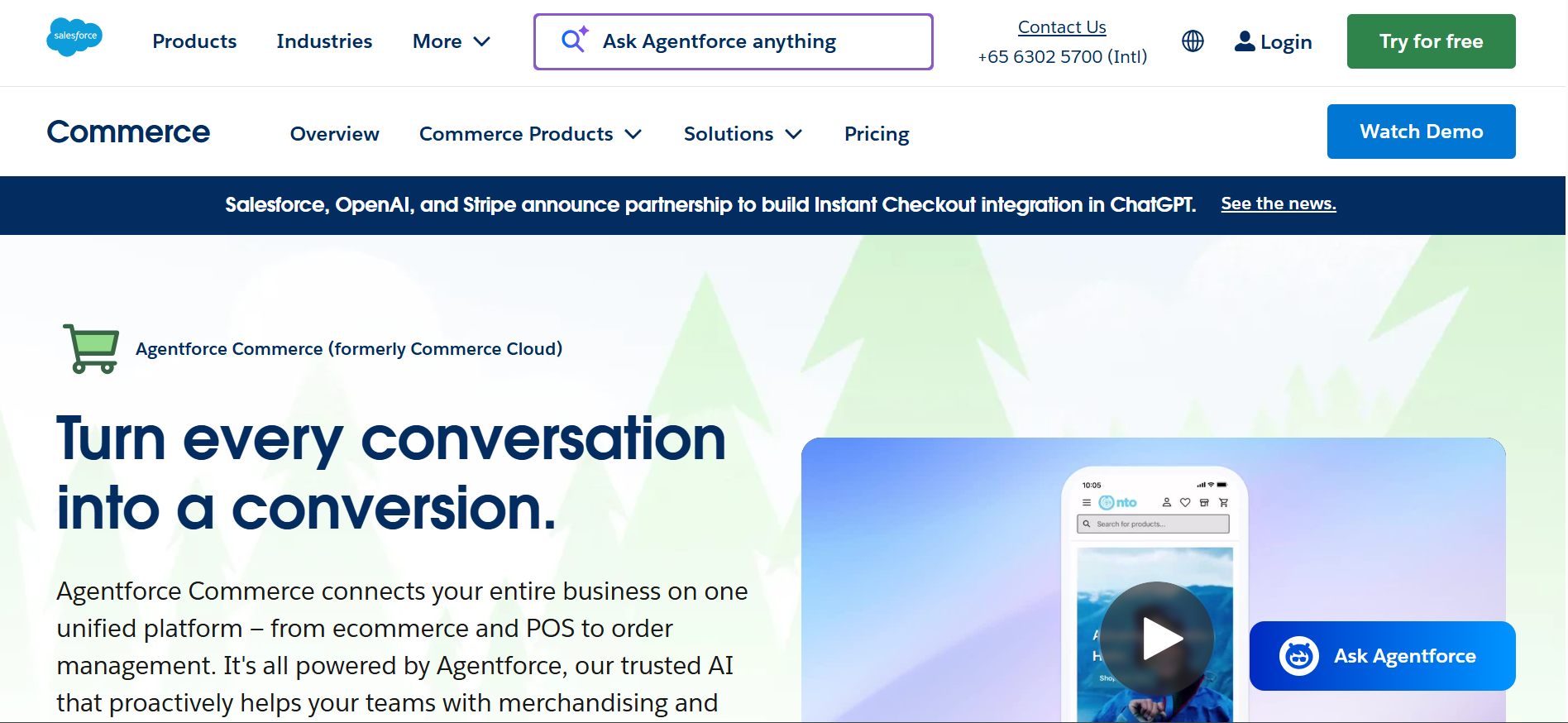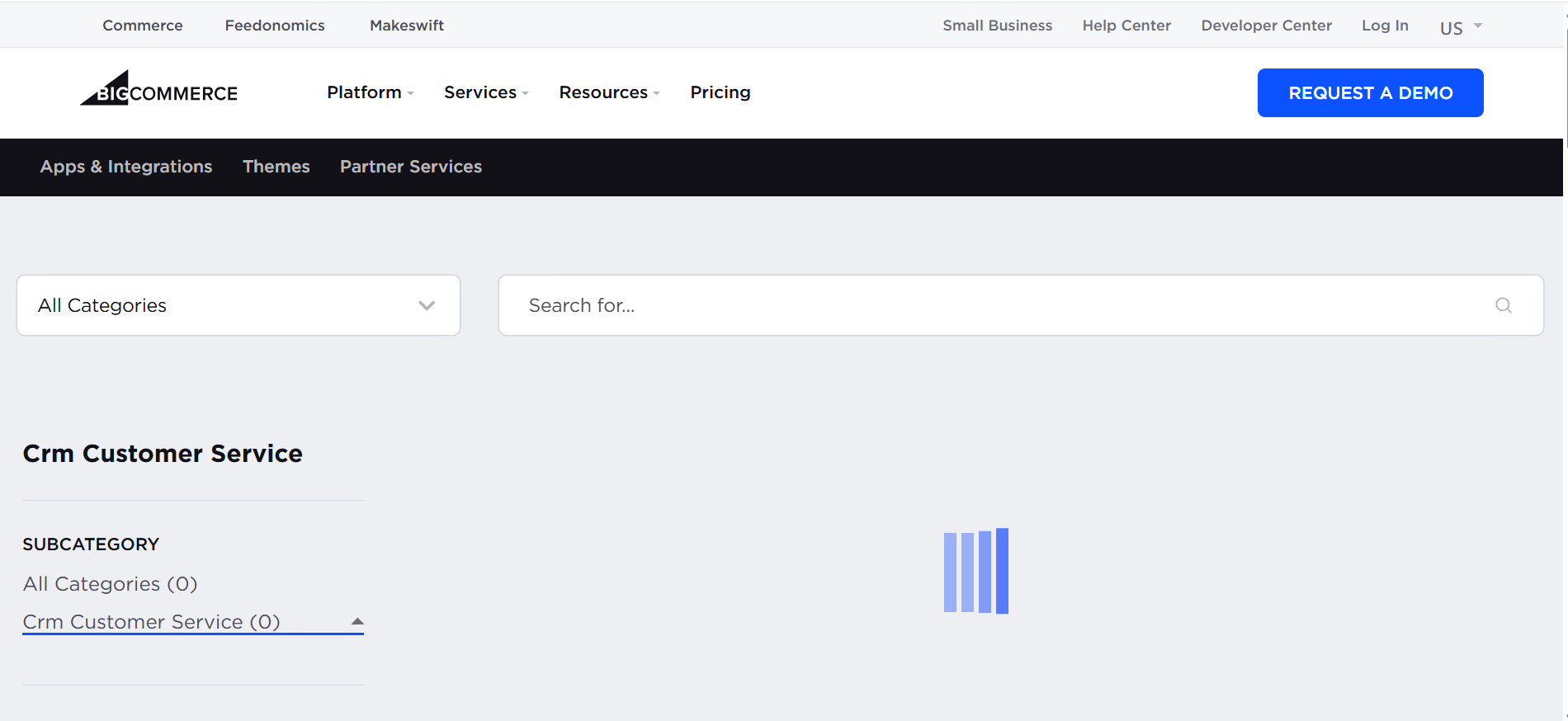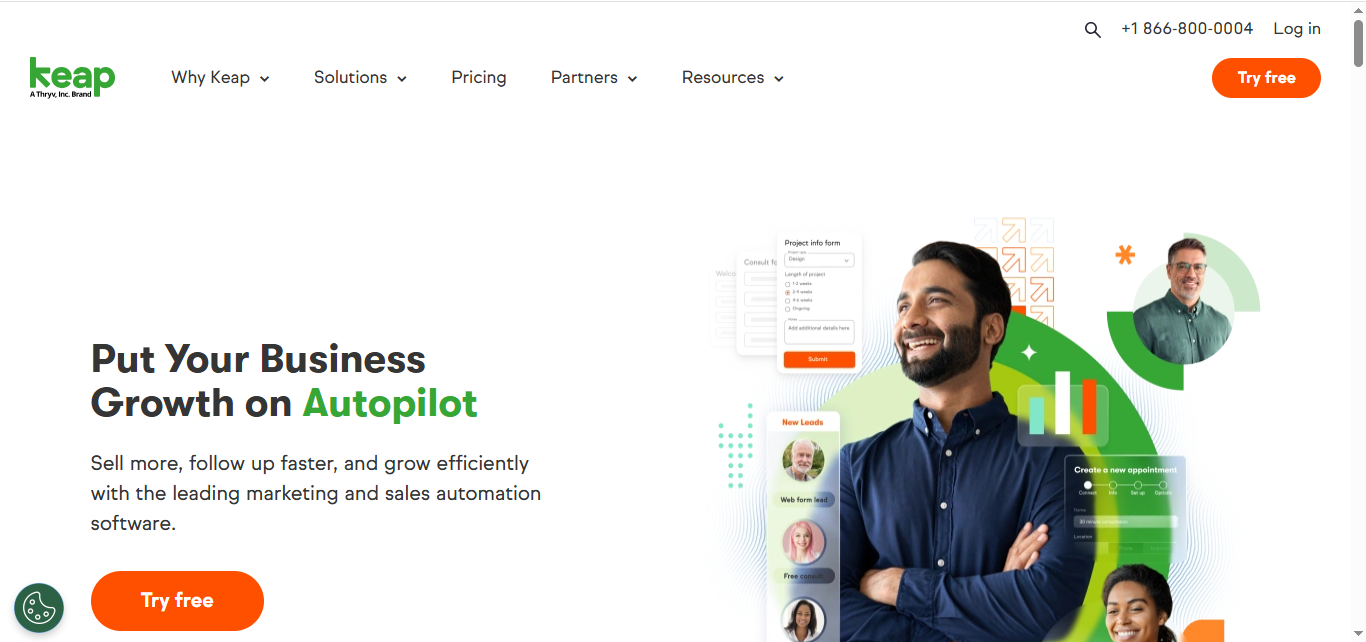Working in e-commerce means juggling customer data, sales, marketing campaigns, and support tickets all at once. Have you ever felt overwhelmed trying to track customer interactions manually? Well done for looking for a solution, because the right CRM can transform your business workflow, boost sales, and enhance customer satisfaction. Sounds good, right? You are at the right place.
In the competitive e-commerce landscape, staying organized is one of the most significant advantages. A CRM for e-commerce centralizes customer profiles, purchase history, communication, and marketing automation in one platform. With the right system, you can track leads, segment customers, send targeted campaigns, and improve retention all without losing time or accuracy.
Before diving into the top options, let’s explore what an e-commerce CRM is, why it is essential, and how to choose the right one for your business.
What Is an E-Commerce CRM?
An e-commerce CRM is a customer relationship management tool designed to manage online store interactions, customer data, and sales activities. It consolidates customer information, order history, support tickets, and marketing activity into a single platform. By centralizing this data, e-commerce businesses can deliver personalized experiences, track customer behavior, and optimize sales strategies.
These CRMs also include marketing automation tools to send email campaigns, cart abandonment reminders, and promotional offers. With an e-commerce CRM, businesses can maintain stronger relationships with customers, improve conversion rates, and increase long-term loyalty.
Why E-Commerce Businesses Need a CRM
E-commerce businesses rely heavily on timely communication, accurate data tracking, and effective marketing campaigns. A CRM eliminates confusion by providing a centralized system for managing customers from first interaction to repeat purchase. This leads to higher engagement, faster problem resolution, and improved customer satisfaction.
Another major advantage is revenue growth. By analyzing customer behavior, segmenting audiences, and automating campaigns, e-commerce businesses can increase sales and reduce churn. CRMs also help track abandoned carts, monitor purchase patterns, and create targeted upselling or cross-selling campaigns for maximum profitability.
How to Choose the Right CRM for E-Commerce
Selecting the right e-commerce CRM depends on your business size, sales volume, and marketing strategy. Identify whether you need a simple tool for customer tracking or a full-featured system with advanced automation, analytics, and integrations. Look for features like customer segmentation, email marketing, order tracking, and integration with your online store platform.
Budget is also critical. Some CRMs are lightweight and cost-effective, while others offer advanced tools for large e-commerce operations. The best e-commerce CRM should streamline workflows, improve sales efficiency, and enhance customer engagement without adding unnecessary complexity.
10 Best CRM for E-Commerce Businesses in 2026
Here is the complete list before we start writing each one:
- Shopify CRM
- HubSpot CRM for E-Commerce
- Salesforce Commerce Cloud CRM
- Zoho CRM for Online Stores
- ActiveCampaign
- Freshsales CRM
- BigCommerce CRM
- Klaviyo
- Pipedrive CRM
- Keap
#1. Shopify CRM
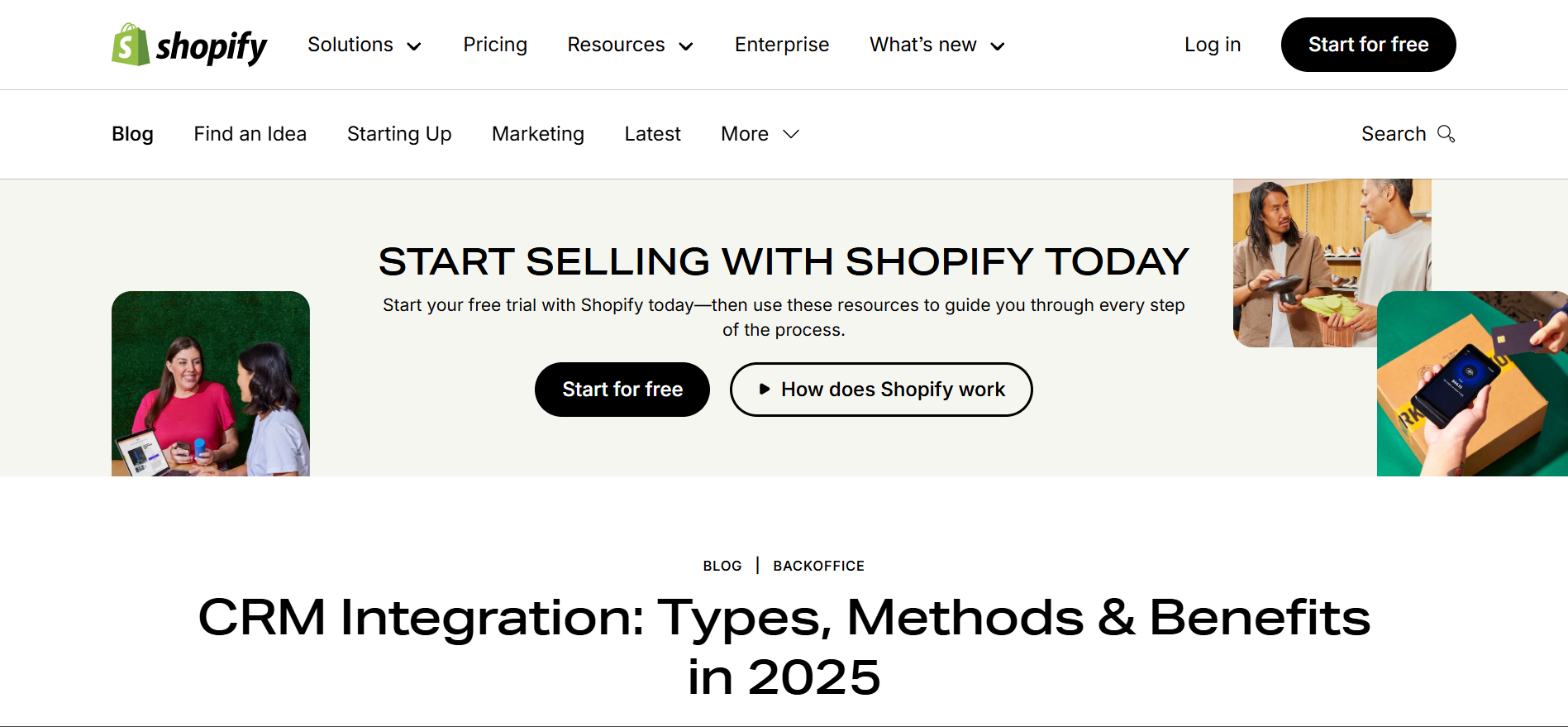
Review
Shopify CRM is designed specifically for Shopify store owners to manage customer data, orders, and marketing campaigns seamlessly. It integrates directly with your Shopify store, consolidating customer profiles, purchase history, and support requests into one dashboard. Automation features allow you to send abandoned cart reminders, personalized emails, and loyalty rewards. Shopify CRM also provides analytics to track customer behavior, sales trends, and marketing performance.
Features
- Centralized customer database and order tracking
- Automated email campaigns and abandoned cart reminders
- Customer segmentation based on behavior and purchase history
- Analytics and sales reporting dashboards
- Integration with Shopify apps and payment gateways
- Loyalty and reward program management
Pros
- Built specifically for Shopify stores
- Strong automation for sales and marketing tasks
- Easy to use and navigate for beginners
- Integrated analytics to track customer behavior
- Supports loyalty programs to increase repeat purchases
Cons
- Limited for multi-platform e-commerce businesses
- Advanced marketing automation may require additional apps
- Reporting features can be basic for large stores
- Cost increases with higher-tier Shopify plans
Final Verdict
Shopify CRM is ideal for store owners who want a seamless, integrated system for managing customers, sales, and marketing campaigns directly within Shopify. Its automation features help save time and increase repeat purchases.
#2. HubSpot CRM for E-Commerce
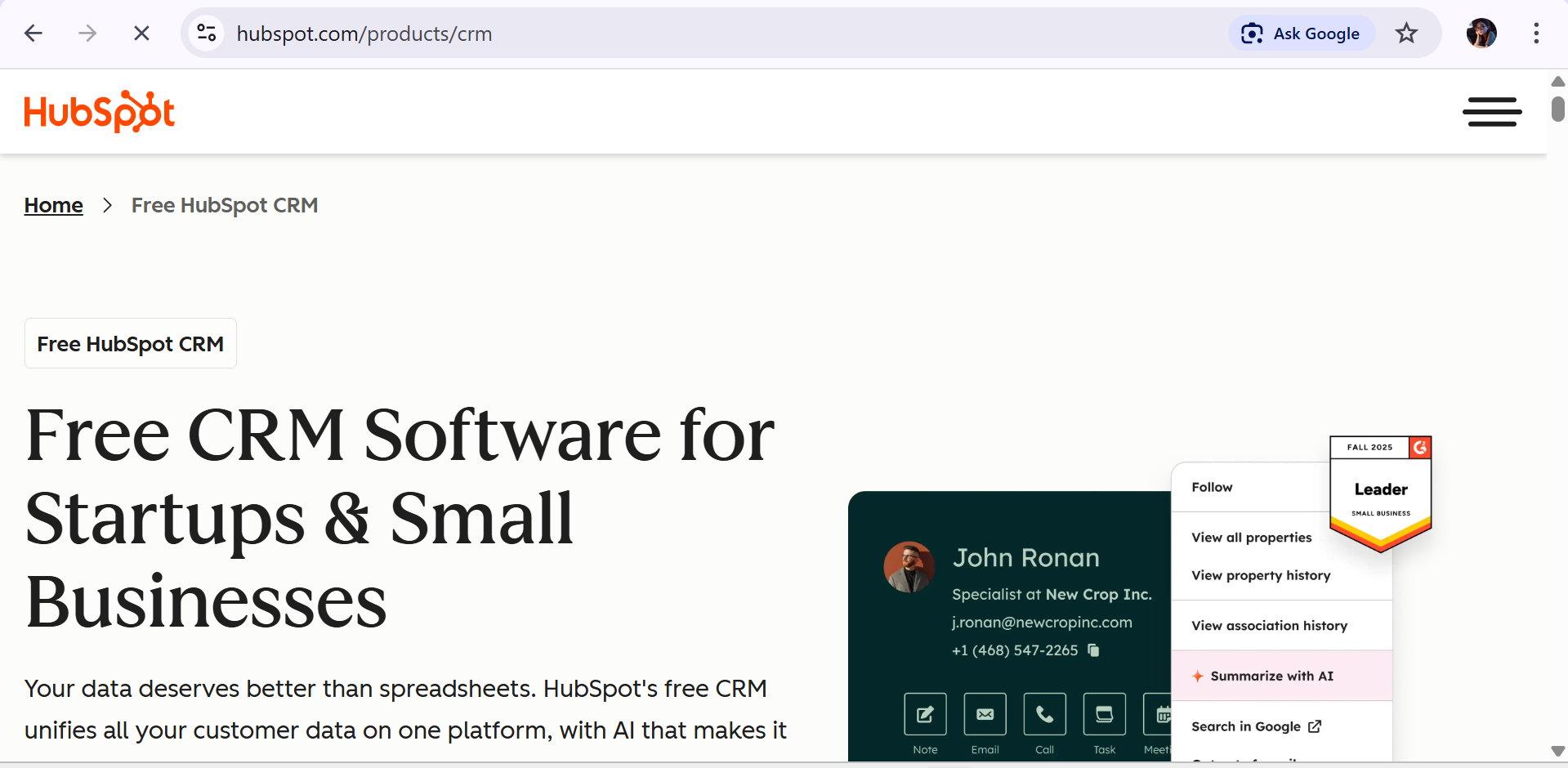
Review
HubSpot CRM for e-commerce helps businesses track customers, manage sales pipelines, and automate marketing tasks. It integrates with popular e-commerce platforms such as Shopify, WooCommerce, and BigCommerce. Users can track customer behavior, create targeted email campaigns, and analyze purchase trends. HubSpot also provides built-in analytics for ROI tracking and lead scoring, allowing e-commerce businesses to prioritize high-value customers efficiently.
Features
- Customer segmentation and behavior tracking
- Sales pipeline and deal management
- Email marketing and automated follow-ups
- Reporting dashboards for sales and marketing
- Integration with Shopify, WooCommerce, and other platforms
- Lead scoring and task automation
Pros
- Free CRM tier available for small businesses
- Seamless integration with multiple e-commerce platforms
- Marketing automation improves engagement and conversions
- Analytics and reporting help optimize campaigns
- Easy to scale as business grows
Cons
- Advanced features require paid plans
- Can be overwhelming for beginners due to feature richness
- Email automation may need upgrades for large-scale campaigns
Final Verdict
HubSpot CRM for e-commerce is perfect for businesses that want a scalable, integrated CRM with strong marketing automation. Its free tier allows smaller stores to get started without extra cost.
#3. Salesforce Commerce Cloud CRM
Review
Salesforce Commerce Cloud CRM is a robust platform for managing e-commerce operations and customer relationships. It combines AI-driven insights, marketing automation, and omnichannel sales management. Businesses can track customer behavior, segment audiences, and send personalized campaigns. Its advanced analytics provide real-time sales and performance tracking, helping e-commerce businesses make informed decisions.
Features
- AI-driven customer insights and predictive analytics
- Personalized marketing campaigns and automation
- Omnichannel sales management across web, mobile, and social
- Advanced reporting and dashboards
- Integration with third-party apps and payment gateways
- Inventory and order management tools
Pros
- Comprehensive CRM for large-scale e-commerce businesses
- AI insights improve marketing and sales decisions
- Omnichannel capabilities for consistent customer experience
- Scalable and highly customizable
- Strong analytics and reporting tools
Cons
- Expensive compared to other CRMs
- Steep learning curve for beginners
- Requires technical support for customization
- Overkill for small businesses
Final Verdict
Salesforce Commerce Cloud CRM is suitable for medium to large e-commerce businesses that need advanced automation, analytics, and omnichannel capabilities. It provides high flexibility but requires investment and expertise.
#4. Zoho CRM for Online Stores
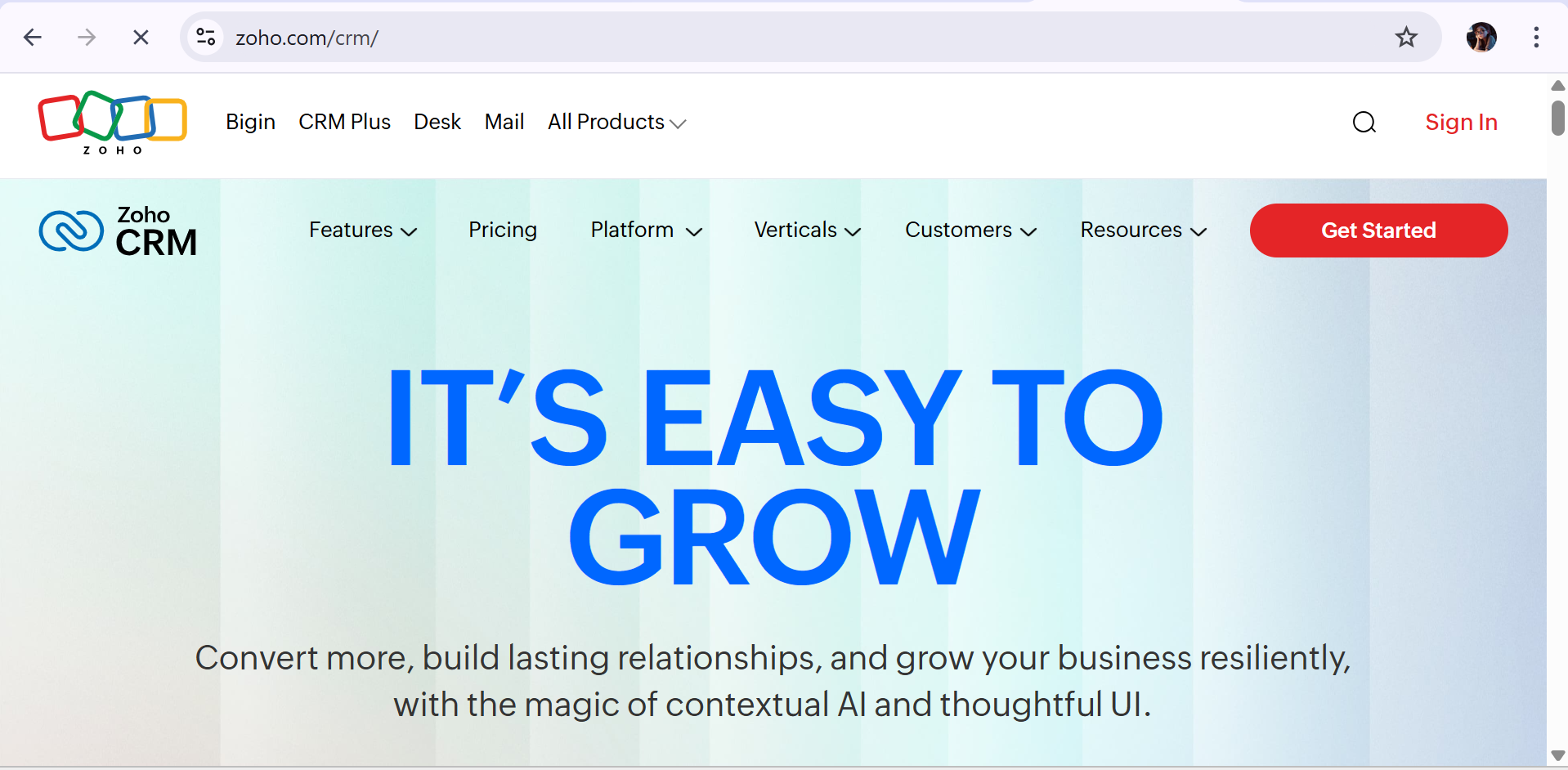
Review
Zoho CRM for online stores offers a flexible solution for managing customer relationships and e-commerce sales. It allows businesses to centralize customer data, track orders, and automate marketing campaigns. Integration with platforms like Shopify, WooCommerce, and Magento ensures that all customer interactions are captured. Zoho CRM also provides analytics, workflow automation, and lead management features to improve sales efficiency.
Features
- Customer database and order tracking
- Workflow automation and lead management
- Email marketing and campaign management
- Analytics dashboards and sales reporting
- Integration with Shopify, WooCommerce, Magento, and more
- Mobile CRM for on-the-go management
Pros
- Affordable pricing for small and medium businesses
- Strong integration options with popular e-commerce platforms
- Automation improves workflow efficiency
- Analytics help track performance and customer behavior
- Mobile app supports remote access
Cons
- Customization may require technical knowledge
- Advanced features only on higher-tier plans
- User interface can feel cluttered initially
Final Verdict
Zoho CRM for online stores is a practical choice for businesses seeking an affordable, feature-rich CRM. Its integration, automation, and analytics features streamline sales and marketing processes efficiently.
#5. ActiveCampaign

Review
ActiveCampaign is an e-commerce CRM that focuses on combining customer relationship management with marketing automation. It helps businesses segment customers, track purchase behavior, and send personalized campaigns via email, SMS, or social media. ActiveCampaign also provides advanced automation workflows, lead scoring, and analytics to optimize customer engagement and increase conversions.
Features
- Customer segmentation and behavior tracking
- Multi-channel marketing automation (email, SMS, social)
- Lead scoring and CRM pipeline management
- Automated workflows for follow-ups and campaigns
- Analytics dashboards and reporting
- Integration with Shopify, WooCommerce, and other platforms
Pros
- Powerful marketing automation for e-commerce growth
- Easy segmentation for personalized campaigns
- Multi-channel communication improves customer engagement
- Scalable for small to large businesses
- Advanced analytics help improve ROI
Cons
- Higher-tier plans can be expensive
- Learning curve for advanced automation features
- Some integrations require technical setup
Final Verdict
ActiveCampaign is perfect for e-commerce businesses that want to combine CRM functionality with powerful marketing automation. Its automation and segmentation capabilities help boost engagement and drive sales efficiently.
#6. Freshsales CRM
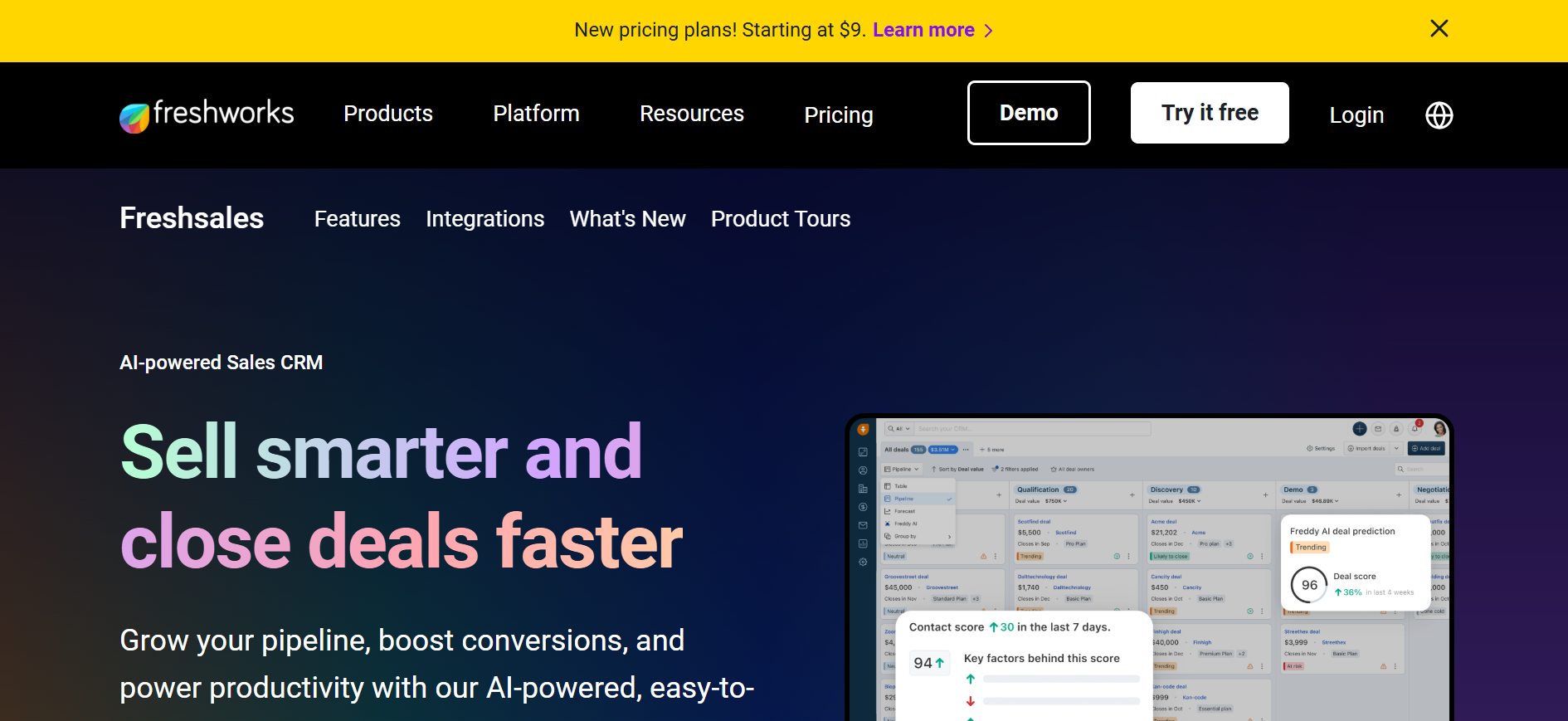
Review
Freshsales CRM is a versatile platform that supports e-commerce businesses with customer relationship management and sales automation. It provides a centralized view of customer interactions, order history, and support tickets. The built-in AI assistant, Freddy, offers insights on deals, lead scoring, and email tracking. Freshsales also integrates with popular e-commerce platforms, allowing businesses to automate workflows and personalize marketing campaigns efficiently.
Features
- Centralized customer database with purchase history
- AI-powered lead scoring and deal insights (Freddy AI)
- Workflow automation and task management
- Email tracking, templates, and campaign automation
- Integration with Shopify, WooCommerce, Magento, and more
- Reporting dashboards and analytics
- Mobile app for managing customers on-the-go
Pros
- AI insights improve sales and customer prioritization
- Easy integration with popular e-commerce platforms
- Automation reduces repetitive tasks and increases efficiency
- Centralized data provides a complete customer view
- Scalable for growing businesses
Cons
- Advanced features require higher-tier plans
- Setup can be slightly complex for beginners
- Reporting customization is limited on lower plans
Final Verdict
Freshsales CRM is a solid choice for e-commerce businesses seeking a versatile, AI-assisted CRM that combines sales automation, customer tracking, and marketing integration in one platform.
#7. BigCommerce CRM
Review
BigCommerce CRM is designed to streamline e-commerce operations for online store owners. It allows businesses to manage customer data, segment audiences, automate marketing campaigns, and track orders. With integrated analytics and reporting, users can monitor sales trends, customer behavior, and campaign performance. BigCommerce CRM also supports multi-channel selling, providing insights across web stores, marketplaces, and social media platforms.
Features
- Customer segmentation and profile management
- Automated email marketing and campaigns
- Order tracking and multi-channel sales insights
- Analytics dashboards for sales and marketing
- Integration with marketplaces and social media platforms
- Loyalty program and coupon management
Pros
- Fully integrated with BigCommerce stores
- Supports multi-channel sales and marketing
- Automation saves time and improves engagement
- Analytics help identify high-value customers
- Loyalty and promotions tools boost repeat purchases
Cons
- Limited for stores not using BigCommerce platform
- Marketing automation is basic compared to specialized CRMs
- Advanced features may require additional apps
Final Verdict
BigCommerce CRM is ideal for businesses operating on BigCommerce who want a simple, integrated system to manage customer data, automate marketing, and track sales across multiple channels.
#8. Klaviyo
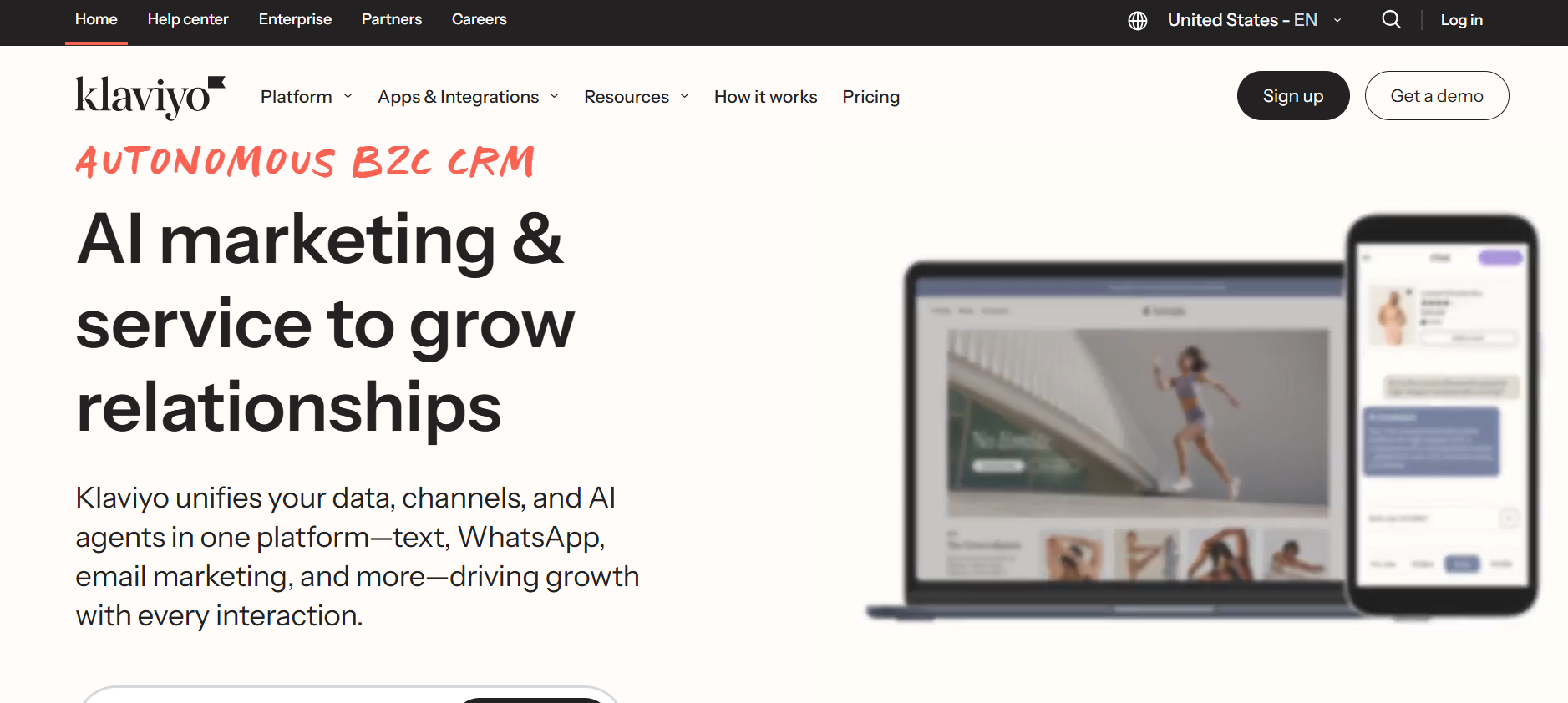
Review
Klaviyo is a CRM built for e-commerce marketing automation and customer engagement. It focuses on personalized email and SMS campaigns driven by customer behavior and purchase data. Klaviyo integrates with most e-commerce platforms like Shopify, WooCommerce, and Magento, allowing businesses to create targeted campaigns based on browsing, cart activity, and past purchases. Its analytics tools provide insights into revenue, engagement, and campaign performance.
Features
- Behavior-based email and SMS marketing automation
- Customer segmentation and personalized campaigns
- Integration with Shopify, WooCommerce, Magento, and more
- Analytics dashboards for revenue and engagement tracking
- Pre-built templates and workflow automation
- Cart abandonment and win-back campaigns
Pros
- Strong automation for email and SMS marketing
- Deep e-commerce platform integrations
- Advanced segmentation for personalized campaigns
- Detailed analytics for revenue tracking
- Scalable for small to large e-commerce businesses
Cons
- Expensive for large contact lists
- Focused mainly on marketing, less on full CRM functions
- Learning curve for advanced workflow setup
Final Verdict
Klaviyo is perfect for e-commerce businesses that prioritize marketing automation and personalized customer communication. Its data-driven campaigns can significantly boost engagement and sales.
#9. Pipedrive CRM
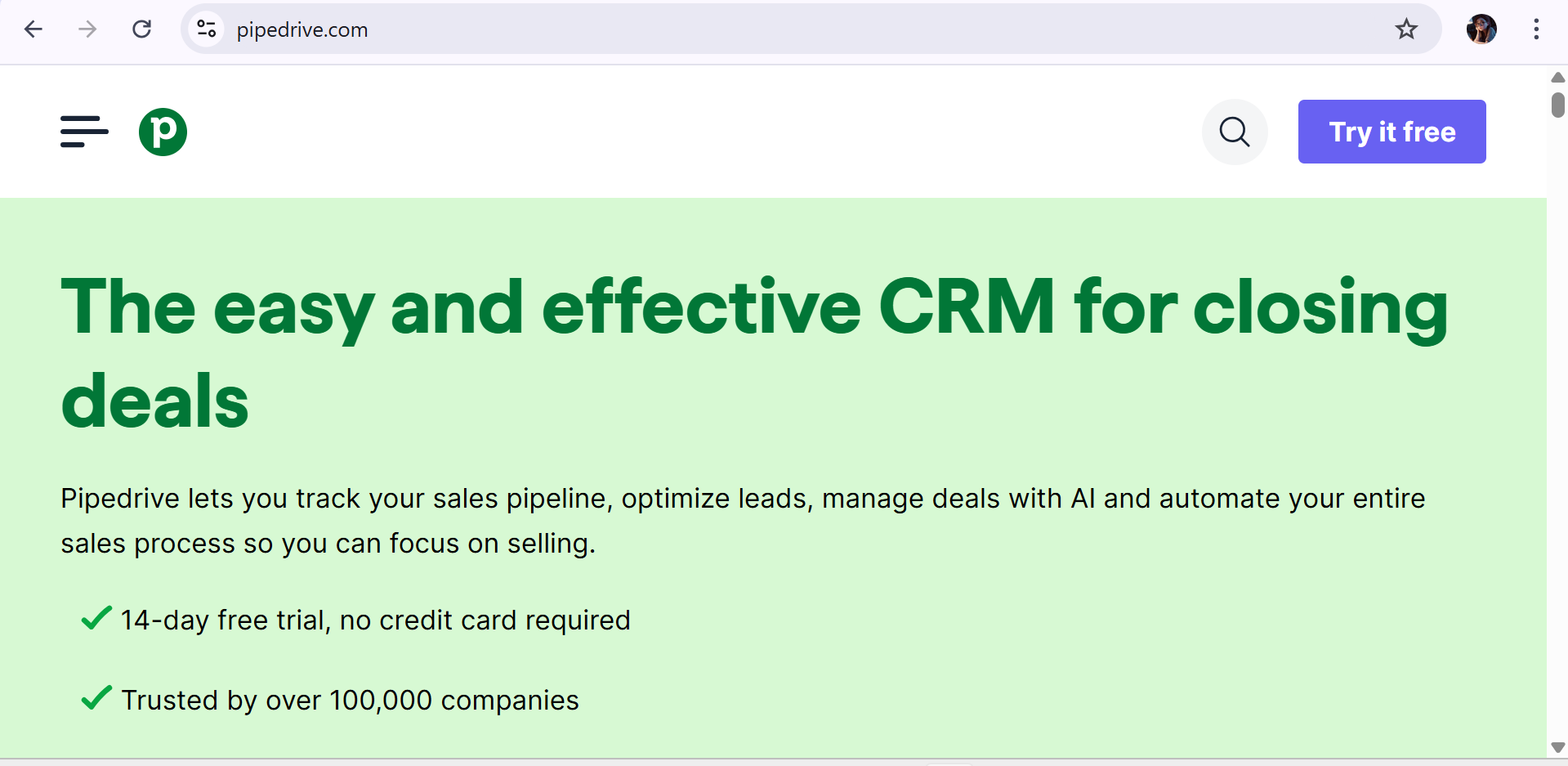
Review
Pipedrive CRM is a visual and intuitive platform suitable for e-commerce businesses focused on managing sales pipelines. It tracks customer interactions, automates follow-ups, and prioritizes leads based on potential value. Pipedrive also integrates with e-commerce platforms and marketing tools, allowing teams to monitor sales performance, track deals, and optimize workflows. Its reporting features provide insight into sales trends and team performance.
Features
- Visual sales pipeline management
- Lead tracking and prioritization
- Workflow automation for follow-ups and tasks
- Integration with Shopify, WooCommerce, and other tools
- Reporting dashboards for sales and pipeline performance
- Email tracking and templates
Pros
- Intuitive visual pipeline system
- Automation reduces repetitive administrative work
- Easy integration with popular e-commerce tools
- Scalable for small and medium businesses
- Reporting provides actionable sales insights
Cons
- Limited marketing automation
- Advanced reporting requires higher-tier plans
- Best suited for sales-focused rather than marketing-heavy operations
Final Verdict
Pipedrive CRM is ideal for e-commerce businesses seeking a clean, visual, and efficient system to manage sales pipelines, track customer interactions, and automate administrative tasks.
#10. Keap
Review
Keap (formerly Infusionsoft) is a CRM and marketing automation platform for small to medium e-commerce businesses. It combines customer management, email marketing, invoicing, and automation into one system. Keap allows segmentation based on customer behavior, automated follow-ups, and integrated payment management. Its reporting and analytics tools help businesses track engagement, sales, and campaign effectiveness.
Features
- Customer database and segmentation
- Email marketing automation and follow-ups
- Invoicing and payment tracking
- Workflow automation for sales and marketing
- Integration with Shopify, WooCommerce, and other platforms
- Reporting dashboards for revenue and engagement
Pros
- Combines CRM with marketing and payment management
- Automation reduces repetitive manual work
- Strong segmentation for targeted campaigns
- Scalable for growing e-commerce businesses
- Analytics help optimize sales and marketing efforts
Cons
- Steep learning curve for beginners
- Can be expensive for small businesses
- Some advanced features require higher-tier plans
Final Verdict
Keap is a comprehensive solution for small to medium e-commerce businesses that want to combine CRM, marketing automation, and payment management in one platform. Its automation and reporting tools help streamline workflows and drive growth.
Conclusion
Choosing the right CRM for your e-commerce business can significantly impact growth, efficiency, and customer satisfaction. Each platform on this list offers unique features, from automation and marketing tools to analytics and multi-channel integrations. Shopify CRM and BigCommerce CRM are ideal for store-specific integrations, while HubSpot, ActiveCampaign, and Klaviyo excel in marketing automation. Salesforce Commerce Cloud and Zoho CRM provide advanced analytics and scalability, making them suitable for larger operations. Freshsales, Pipedrive, and Keap combine sales management with automation to streamline workflows.
By implementing a CRM tailored to your business needs, you can centralize customer data, automate repetitive tasks, segment your audience, and ultimately improve engagement and sales. A well-chosen CRM allows you to focus on growing your e-commerce business while maintaining strong relationships with your customers.
Frequently Asked Questions (FAQs)
What is the best CRM for small e-commerce businesses?
For small businesses, Shopify CRM, ActiveCampaign, and Keap are excellent choices due to their ease of use, automation features, and affordability.
Can these CRMs integrate with multiple e-commerce platforms?
Yes, most CRMs like HubSpot, Zoho, Klaviyo, and Freshsales support integrations with platforms such as Shopify, WooCommerce, and Magento.
Do these CRMs support marketing automation?
Absolutely. CRMs like ActiveCampaign, Klaviyo, HubSpot, and Keap provide email, SMS, and multi-channel marketing automation to increase customer engagement.
Which CRM is best for analytics and reporting?
Salesforce Commerce Cloud, Zoho CRM, and Freshsales offer advanced analytics dashboards, real-time reporting, and insights to optimize sales and marketing strategies.
Are these CRMs suitable for growing e-commerce businesses?
Yes, all listed CRMs are scalable, allowing small businesses to start simple and expand features as the business grows without switching platforms.
